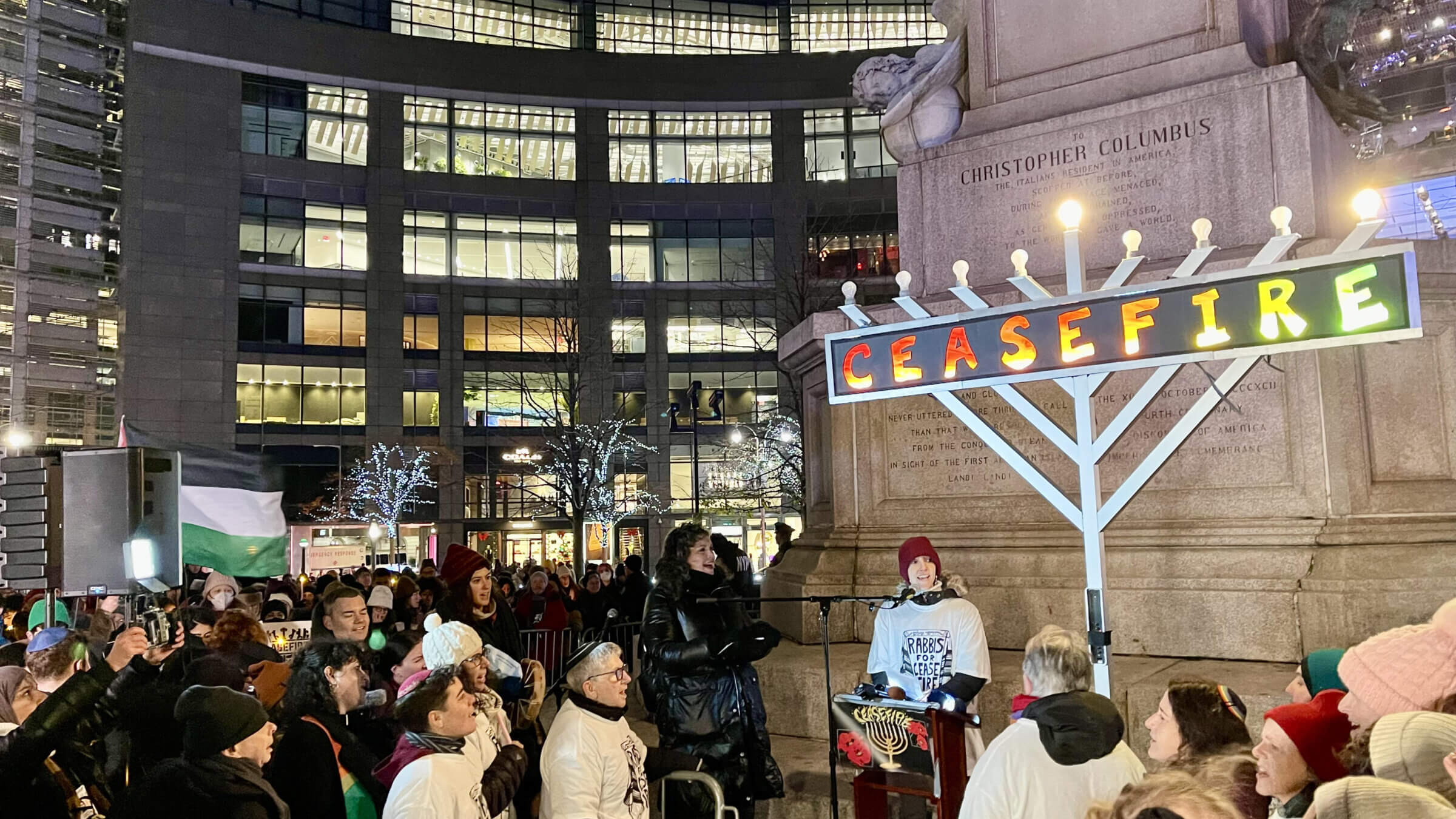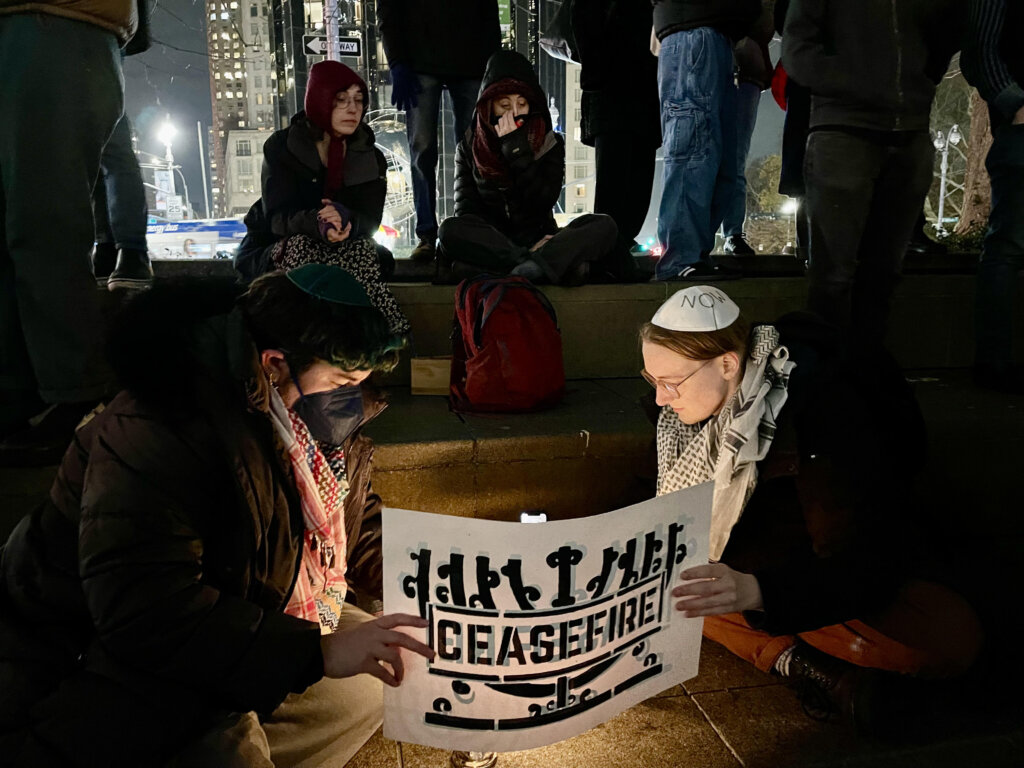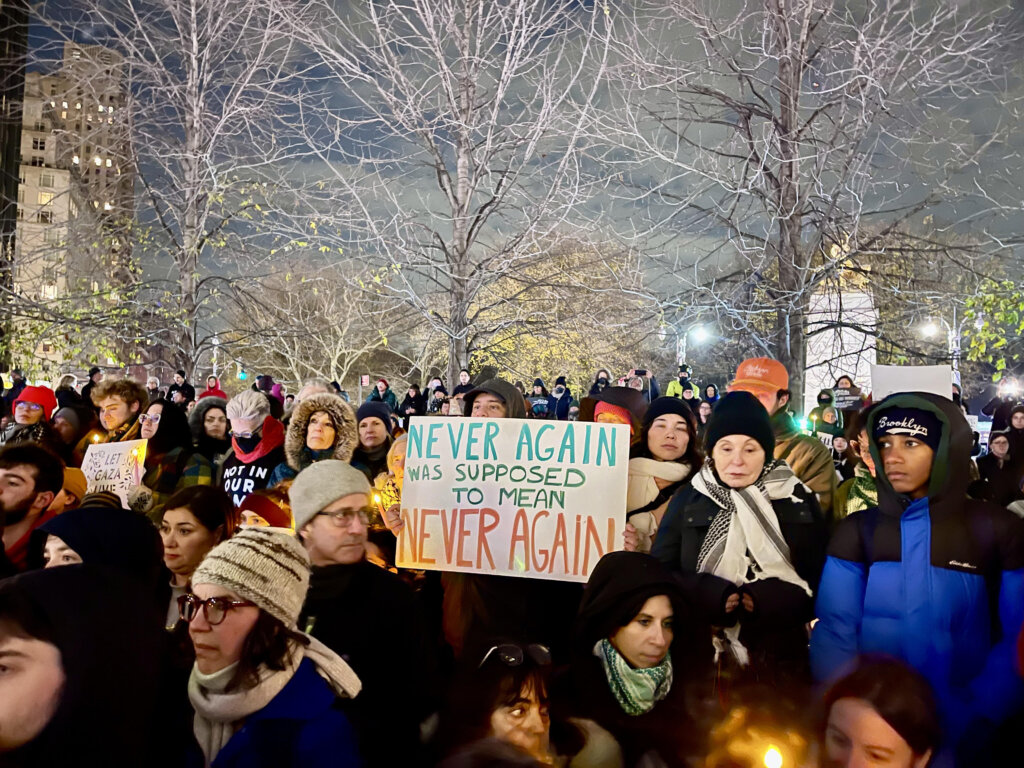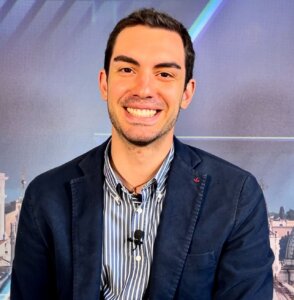On the first night of Hanukkah, hundreds call for a cease-fire at a Manhattan menorah lighting
‘It doesn’t look to me like anyone is getting safer or more secure with what is happening now,’ said City Comptroller Brad Lander

A gathering in Columbus Circle in Manhattan on the first night of Hanukkah to call for a cease-fire in the Israel-Hamas war, on Dec. 6. Photo by Camillo Barone
More than 500 people gathered in New York’s Columbus Circle Thursday evening to mark the first night of Hanukkah and to call for a cease-fire in Israel’s war against Hamas in Gaza.
Organized by Jewish Voice for Peace, IfNotNow, Jews for Racial and Economic Justice and other left-leaning groups, the two-hour event featured prayers, songs and speeches from activists, rabbis and politicians who denounced Israel’s offensive in Gaza, which according to health officials in the Hamas-controlled territory has killed more than 17,000 Palestinians.
The centerpiece of the event was a menorah, about 14 feet high, emblazoned with the word “ceasefire.” Organizers passed out a song sheet and the crowd said the traditional Hanukkah blessings and sang about peace and healing.

Israel’s offensive in Gaza began shortly after Oct. 7, when Hamas terrorists from Gaza killed 1,200 Israelis and kidnapped 240 — more than half of whom are still held captive.
Israel has vowed to dismantle Hamas, and Hamas has vowed to attack Israel again. But organizers of Thursday’s event, which began shortly after sundown, said Israel’s war flouts Jewish values. Many speakers equated it with genocide.
“We’re told to break any law, violate any tradition for this one thing: do anything that you can for pikuach nefesh, to save a life. Any life, anytime, anywhere,” said Rabbi Linda Joy Holtzman, director of student life at Reconstructionist Rabbinical College.
Fighting in Gaza has intensified dramatically in recent days, with no sign of a cessation of hostilities two months into the war.
Wallace Shawn, the actor perhaps best known for his performance in The Princess Bride, compared the Israeli government to Hamas, which the U.S. has designated a terrorist group.
“The leaders of Hamas and the government of Benjamin Netanyahu both think that it’s sometimes appropriate to slaughter the innocent on the other side,” Shawn said. “I don’t accept that.” He accused the U.S. of being “full participants in it.”

Among the elected officials at the event were City Comptroller Brad Lander, the city’s highest-ranking Jewish official; and Councilmember Shahana Hanif, a Bangladeshi American Muslim who represents a Brooklyn district once represented by Lander. It includes neighborhoods with many Jews, such as Park Slope, which leans left, and Borough Park, home to many Orthodox.
“That period when hostages were coming home and bombs and rockets were not falling seemed like one moment when you start to imagine a way out of this, that is safer for Israelis and Palestinians,” Lander said in an interview, referring to a temporary cease-fire that ended last week. “It doesn’t look to me like anyone is getting safer or more secure with what is happening now.”
Lander has backed calls for a cease-fire in Gaza, and signed a statement with five other Jewish elected officials in which they wrote that they are “deeply distressed” by the military campaign.
A recent poll showed that a majority of New York City voters —54% — support Israel’s military response to Hamas in the Gaza Strip, a 25-mile-long enclave that borders Israel. Liberal voters, however, are divided — 46% to 43% — with a plurality saying that killings of Palestinian civilians should be condemned without hesitation.
Other speakers included Peter Beinart, the editor of Jewish Currents, a news outlet that has been highly critical of Israel; Rabbi Abby Stein, of the Rabbis 4 Ceasefire group; and Palestinian American activist Linda Sarsour, the former executive director of the Arab American Association of New York.
A message from our Publisher & CEO Rachel Fishman Feddersen

I hope you appreciated this article. Before you go, I’d like to ask you to please support the Forward’s award-winning, nonprofit journalism so that we can be prepared for whatever news 2025 brings.
At a time when other newsrooms are closing or cutting back, the Forward has removed its paywall and invested additional resources to report on the ground from Israel and around the U.S. on the impact of the war, rising antisemitism and polarized discourse.
Readers like you make it all possible. Support our work by becoming a Forward Member and connect with our journalism and your community.
— Rachel Fishman Feddersen, Publisher and CEO



























